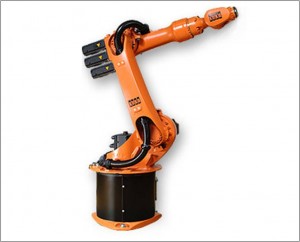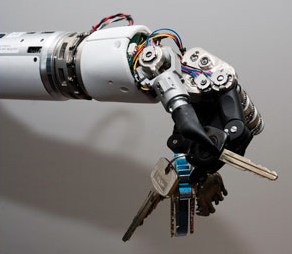or Mechatronic Engineering, humourously (but incorrectly) referred to as Megatronics at times. In Afrikaans Megatronika or Megatroniese Ingenieurswese. What is it? What can you do with it? When I started studying I didn’t know, after 5 years I think I have a vague idea. So below I’m going to post what I know.
In it’s simplest form it’s a combination of Mechanical and Electronic Engineering. If I really don’t feel like explaining, I simplify it to robotics. This is certainly a large portion of Mechatronics, but by no means a limiting factor.
Mechatronics as a named profession is fairly new, but the idea has always been there. In the South African context, UCT have had an accredited BSc (Eng) Mechatronics course since 1997 (although how long it has actually been running is uncertain), NMMU a BEng since 2007 (first graduates) and Stellenbosch since 2005 [1]. Potchefstroom University (NWU) are apparently aiming to start a course in the next few years [2]. Although not offered in the BEng format, UKZN do offer Masters through their Mechatronics and Robotic Research Group [3]. [EDIT: added list of BTech degrees and Diplomas offered at the bottom of the post]
Mechatronics at Stellenbosch [2]
I completed my BEng Mechatronics at Stellenbosch University in 2011. The Mechatronics course was presented by the Department of Mechanical and Mechatronic Engineering in a four year course. The first two years were identical to that of those studying towards a BEng Mechanical. The first year course is identical for all engineering students. In the third and fourth years, the two courses still followed similar routes, with the Mechatronics course replacing several Mechanical courses with some courses presented by the Department of Electronic and Electrical Engineering. In third year these included Electronics and Computer System’s courses and fourth year Electronics and Electronic Design Courses. Losing out on some Strength of Materials and Thermo-Fluid Mechanics.
The department put it this way [6]
The most important difference between the mechanical engineering programme and the mechatronic programme is that mechanical engineers are equipped to develop mechatronic systems with existing controllers (computers, PLC’s, etc.), while mechatronic engineers are also equipped to develop specialised controllers (e.g. for embedded controllers) and the relevant electronics themselves.
At the time, the Head of Department felt that Mechatronics as an entity was still too new. Employers weren’t advertising for Mechatronic Engineers, and didn’t really know what to do with them when they did get them. This resulted in the close ties between the Mechanical and Mechatronic courses. I was often unhappy about this, having would of preferred more focus on the Electronics, but in the end it worked out. And the HoD’s opinions were/are valid.
When I chose Mechatronics, I didn’t know where I was going to work, I chose the course because it sounded interesting. It wasn’t until my final year that I found a direction to work towards. Course setups at different universities are going to be different, and will put emphasis on different subjects, that doesn’t necessarily make one better than the other. Either way you’re going to come out of it with a degree and a fair amount of knowledge. Most importantly though (and this is true for any engineering degree) is you’ll know how to learn.
I’m quite confident that specific things that I learn in my first year of work will be of more value to my career than a specific subject at varsity, but having struggled through several subjects, I know I can figure out most things that come my way. I know where to look and how to go about solving problems.
In my final year we were a class of 85 Mechanical/Mechatronic students, of which I’d say about 30-35 received their BEng Mechatronics in 2011.
Mechatronics at NMMU [2]
NMMU have a slightly different setup. Mechatronics is presented by the Mechatronics school of the Department of Engineering, the Built Environment and IT. Mechatronics is the only Engineering degree they offer. As such, first year physics and maths are taken alongside BSc students and after the first year, courses taken are aimed only at Mechatronics students. The format of the course is still identical to that of when it started giving a good balance of subjects. The University also offers an array of BTech degrees in other Engineering fields.
I’m currently pursuing my master’s degree at NMMU. Their 4th year BEng Mechatronics class has roughly 25 students in it and the 3rd year class about 30. First year applications are limited to 60, with the most recent 1st year class starting with 50 students. The Mechatronics department is currently sponsored by General Motors South Africa (who have a plant in PE) and also have close ties to the Volkswagen plant in Uitenhage.
Mechatronics in General
Mechatronics as a career is still finding its feet. Meaning many consider it a jack of all trades, master of none type of situation, and although the course may feel that way, it’s certainly not the end of the story.
Mechatronics isn’t a new field, it’s just finally been given a name. When you tell people you’re a Mechatronic Engineer they don’t know what that is. I had a month stint at a large production facility as part of vacation training and I was asked to choose between focusing on their Mechanical or Electrical divisions, eventually settling for a bit of time at each. But that’s how businesses in SA are structured. This will change.
Several Mechatronic Engineers that I know have taken up Automation maintenance posts. Nothing wrong with this, personally it’s not where I want to be. Contrary to this though, my first job next year will be in automation maintenance. I however plan to use this as a stepping stone into a design career.
Automation is fun, and whereas I am going into automation in a production sense, automation also relates to smaller and/or more technical situations. The recent landing of the Curiosity rover on Mars is a perfect example of Mechatronic systems. There are several elements here, from the automated landing system to the remote control of the device.
In the motor industry, systems such as traction control, ABS and ESP are all examples of Mechatronic systems. Heavily complicated systems that rely on the processing of data from sensors to enable control of actuators. As such a Mechatronic Engineer can make him/herself home in many different industries. These include the Automotive, Aerospace, Manufacturing, Medical and Communications Industries.
Mechatronic Engineers can register with ECSA to become Professional Engineers [4]. The industry is governed by the South African Institute for Mechanical Engineers. I don’t see Mechatronics separating from this tree any time soon. The degree, being accredited by ECSA also means that the degree will be recognised internationally in many countries thanks to the Washington, Sydney and Dublin Accords [5]
So what do you do when you have your degree? You do whatever you want. You’ll find something. I’m not aware of any of my colleagues who are currently not pursuing a post-graduate degree or are employed. Not all of them are in Mechatronic specific posts. Some have opted for more mechanical orientated jobs, while others have gone entirely into areas such as electronic design or programming. And that’s one thing, a degree in Mechatronic Engineering in no way limits you. Very few engineering degrees will actually.
After re-reading what I’ve written, I think I’ve put forward some information relating to Mechatronic Engineering, but it’s still left fairly vague, maybe it’s just because none of us know what we’re really doing :)
A National Diploma in Mechatronics (for registration as a Professional Engineering Technician) can also be had from the following institutions [7]:
- Tshwane University of Technology
- UNISA
- Cape Peninsula University of Technology
A BTech in Mechatronics (for registration as a Professional Engineering Technologist) from [8]:
- Tshwane University of Technology
- UNISA
- Cape Peninsula University of Technology
and to reiterate, a BEng, or BScEng (for registration as a Professional Engineer) [1]:
- Stellenbosch University
- University of Cape Town
- Nelson Mandela Metropolitan University
Note: Although other institutions may offer courses in Mechatronics, or Mechanical Engineering with a focus on Mechatronic elements, the ones listed above are the only ones recognised by ECSA for registration as a mechatronic professional. Information was correct at time of posting, but may have changed since.
There are also several Universities of Technology and FET Colleges which offer courses in Mechatronics. CPUT is one of these institutions. Another training institution is Umbilo Training Specialists in Durban. They are running a free training course, once a month where anyone can come to learn more and expand their knowledge. Checkout their page for details.
For some more reading and a very complimentary view with some poignant remarks have a read here.
As part of my degree at Stellenbosch University I completed a project which can be seen here.
As part of my master’s degree at NMMU I completed a project which can be seen here and here.
If you’re looking for bursaries, try this website.
If you have any questions, feel free to ask in the comments section.
- [1] ECSA – Accredited Universities
- [2] Much of what is stated comes from my own experiences and conversations with relevant people.
- [3] UKZN – Mechatronics and Robotics
- [4] ECSA – Registration
- [5] ECSA – Recognised Qualifications
- [6] Stellenbosch University – Mechatronic Engineering
- [7] ECSA – Accredited Diplomas
- [8] ECSA – Accredited BTech





Hi
Your blog is what I have been looking for!! My son (Gr10) would like to become an Engineer, with specific interest in mechatronic engineering. I have been told by so many people now that NMMU’s qualification is inferior to that of Stellenbosch and that they don’t offer a degree. Your blog has now confirmed that Mechatronic engineering is indeed a degree qualification at NMMU. Is there any specific reason why Stellenbosch should be better than NMMU in this field?
How does opportunities look (worldwide) for Mechatronic Engineers?
Regards
Cornel
Hi Cornel
NMMU definitely do offer a BEng degree in Mechatronics. I don’t know exactly how one would compare two degree’s to say one is inferior than the other. I had chosen Stellenbosch as the university I wanted to study at before I knew what I was going to be studying, and the decision wasn’t necessarily academically motivated.
The two courses are slightly different but at the end of the day you’re going to get the same degree. I wouldn’t say that one is necessarily better than the other, it would in general fall under people’s subjective feelings towards the different universities, and won’t necessarily be based on the strengths of the degree itself. That being said, I don’t know how industry in general feels about it.
Both universities offer a strong degree program. My family had all attended Stellenbosch University and my home is nearby. For me the campus life in Stellenbosch (having stayed in a residence) was better than what I’ve experienced at NMMU, where the campus is slightly more spread out, with most students living in surrounding areas and not on campus itself. Again I’ll say that I experienced NMMU as a senior student and don’t know what it’s like starting as a first year.
On a worldwide scale there are definitely opportunities for Mechatronic Engineers. It all depends on the direction one wants to take. I’m currently doing Research at a German University and have come in contact with many students from all over the world (Brazil, Mexico, USA, Germany, Saudi Arabia) who all have promising careers available in their respective countries and I’ll be returning to South Africa at the end of this year to start work.
i am currently doing my matric in eastern cape. I have the passion for engineering, and right now i am stuck in choosing which course i should take. Either Mechatronics or Instrumentation, i recently found out about mechatronics. I would like to know if i might get a good job? Which one would you consider for me? Please help.
Hi Nigel
I unfortunately know almost nothing about Instrumentation as a vocation. I can answer questions about Mechatronics, but don’t feel I’m in a position to advise on what course to take. I can tell you Mechatronics is a fairly difficult course, but that it can be rewarding. All that I can advise is that you find out as much information about the two courses and make a decision based on where you feel your interests most lie.
If you get your Mechatronic (or any other Engineering Degree), you can be assured of a job. You may have to work a bit to get one in a direction that you enjoy the most, but there are jobs available. In South African and abroad.
Unfortunately I don’t know you well enough to make a decision for you.
Good luck, and I’d be more than happy to answer any questions for you.
Gareth
Hi
I found this blog to be quite informative and really helpful. I am currently a matriculant and wish to further my studies with Engineering, particularly Mechatronics. Just like yourself, this choice is based on interest and belief that I will find enjoyment in it (I mean just the name is enough to hook someone). The problem I face is that I’m based in Durban and will most likely have to attend UKZN but unfortunately as far as I know, UKZN does not offer the course. Can one branch off at the university into Mechatronics after a year of Mechanical Engineering? From what I’ve learnt, one would have to study a bit of computer science as well. I have no background with regards to that, is it difficult to get the hang of? I also have no clue with what type of job I would like to take up after getting the degree, I’m guessing that will come naturally to a person whilst studying the course? Hope my questions related to others. Appreciate the blog and thanks in advance Gareth
Hey Noor
I’m glad you found my blog, it’s why I created it. As far as I know you can’t study Mechatronics at UKZN. Whether you’ve done a year of Mechanical engineering or not, you won’t be able to get a Mechatronics Degree from UKZN.
In general, doing a Mechanical Engineering degree wouldn’t prevent you from going into Mechatronics at a later stage. As I’ve said in my blog, the engineering degree is the important part. I’d imagine at UKZN you’d be able to do a project in your final year which is focused more towards Mechatronics, but the coursework you’re going to do during your four years has very little programming and electronics.
You don’t need programming to get into a Mechatronics course, but it does help. They will however teach you all the programming you need in the course. Programming is fairly logical and can be easy to pickup.
If you really want to get into Mechatronics I’d advise going to Stellenbosch, UCT or NMMU. You can also have a look if any of your local technikons offer it. If you do have to go to UKZN, phone or email some people at the engineering department and enquire about mechatronics, they will know more about how things work at UKZN than I do. Try contacting Prof Glen Bright specifically.
As mentioned I didn’t know where I was going to work, but as you study and learn what all is encompassed by your degree, you can find an area which interests you particularly.
hi,
I’m a Nigerian who intends to pursue my postgraduate studies in south afica and i intends studying Mechatronics.Kindly advised me the best school to attend, considering the school fees and level of intensive practical experience they offer.
I am so much thrilled with your experience at those schools you mentioned above.
Thanks
Hi Adegbola
I assume you already have a degree in some form of Mechatronics, and that you’re wanting to do a Master’s degree in SA? I’d say that deciding where to study you should first decide what kind of project, or what area of Mechatronics you want to do your Master’s in. Once you’ve decided that have a look at the different universities and find the ones that have research areas in your desired field.
Unfortunately I can’t provide information on the costs at the various universities. What you should find is that all the universities will be able to offer you some form of scholarship (depending on the field), which would go a long way to covering costs. I was offered R60k pa from Stellenbosch, and received R53k from NMMU this year, although there is more available if you know where to apply. As far as I know these were not specifically for SA residents.
The cost for my first year of Masters at NMMU was R15k, but international students often have to pay higher fees at South African universities.
Regards
Gareth
Hi Gareth
Your blog is a great start to spreading the word about Mechatronics Engineering. I wanted to point out that there are also several Universities of Technology who offer suitable programmes, as well as FET colleges for students who do not have the entrance requirements for a Bachelor’s. My institution (CPUT) has a very successful Mechatronics Diploma Program (started in 2007) and it boasts 100% workplace learning placement and subsequent employment. We also have very close ties with your alma mater (SUN) and our top students have been accepted onto the SUN Master’s programme. There is a great deal of collaboration between many of the institutions and industries offering Mechatronics training, and the Mechatronics Education Forum of SA was formed 3 years ago, in order to collaborate on curriculum and programme design.
Hi Karin
Thanks for the info. I’ve put a link to your CPUT website into the article. Do you know where I could find a list of institutions that offer some form of Mechatronics course? Or more information about the Mechatronics Education Forum of SA?
Regards
Gareth
I just wanted to know if one can start to do their Mechatronics degree in the second semester at NMMU because he/she might have to write supplementary exams in March if they don’t reach the minimum admission requirements? NMMU has no testing band for Mechatronics and you have to reach 38 points to be even considered to do Mechatronics.
Hey Gavin
Unfortuantely I think it’s highly unlikely that you’ll be allowed to only start in the second semester. Several of your second semester subjects follow on directly from the first semester subjects. Maths could be specifically tricky if you haven’t had the first semester.
If you want you can possibly do one or two subjects at an accredited college and possibly get this off at the university, but I can’t guarantee that. It’d be best to speak to someone at the university.
Thank you very much for the help Gareth. I will go to the university ASAP to find out if thats possible.
Hi I’m deciding between mechatronics and electrical engineering could you give me some advice?
Hey GG
It’s really difficult to say. What do you enjoy doing? What kind of work do you want to do?
Hi there,
Can a Marine Engineer persues studies in Mechatronics?
Hey Isidoro
I’m not quite sure what you mean. Have you already qualified as a Marine Engineer? Depending on where you’re studying you can possibly do a switch to Mechatronics and be given some credits off the course. If you give me more details I’d be able to give you a better answer.
Hi
I want to do mechatronics at unisa this year.but where do I find help if I am stuck,like students who does accounting have flb which is accredited by unisa
Please help ASAP
Hey Mlungisi
From what I can tell UNISA don’t offer a mechatronics course, only mechanical. I’m not aware of fib, so sorry I can’t really offer any advice. If you give me some more info maybe I can help.
EDIT—
I’ve been told they do offer a Mechatronics stream from the Electrical Engineering course.
You can try having a look here for seeking help, tutors etc.